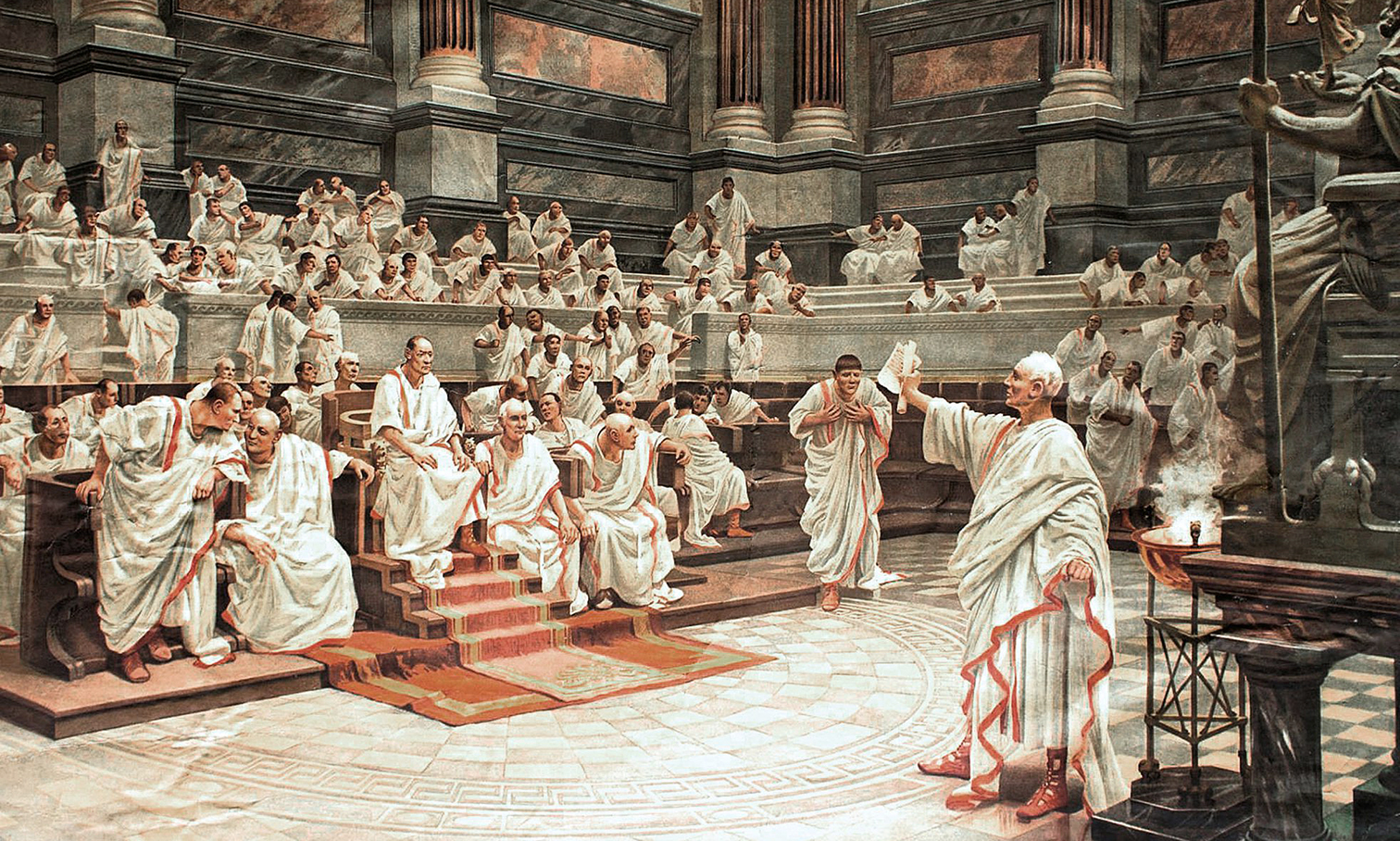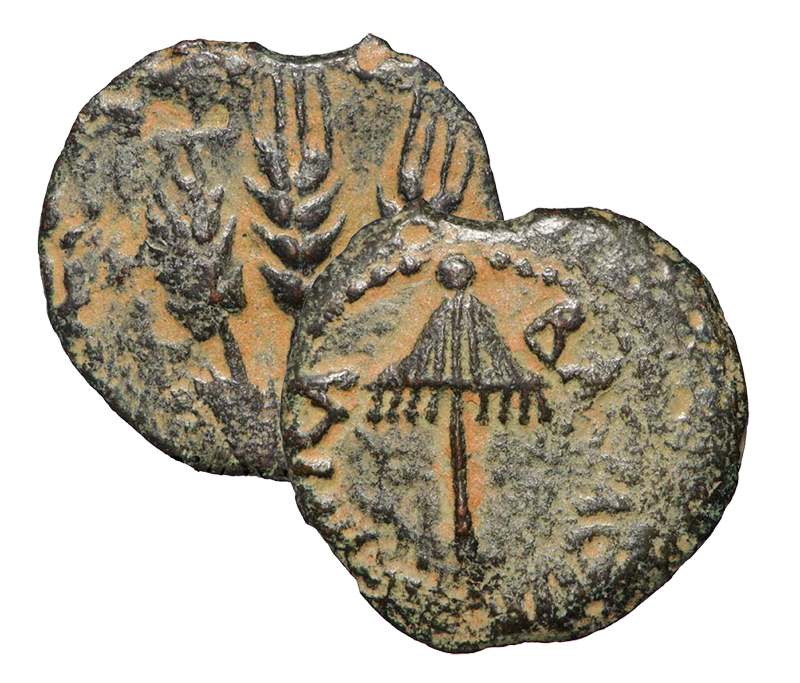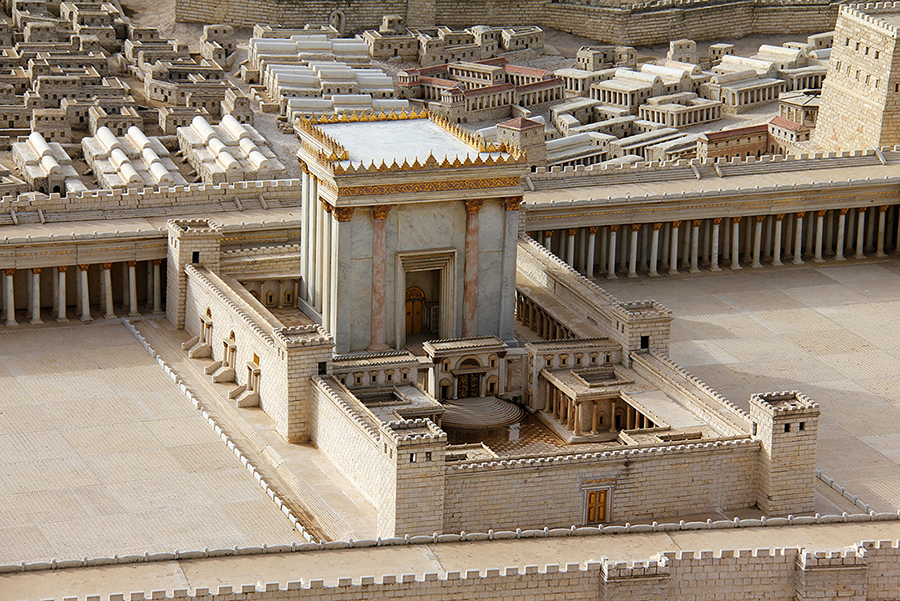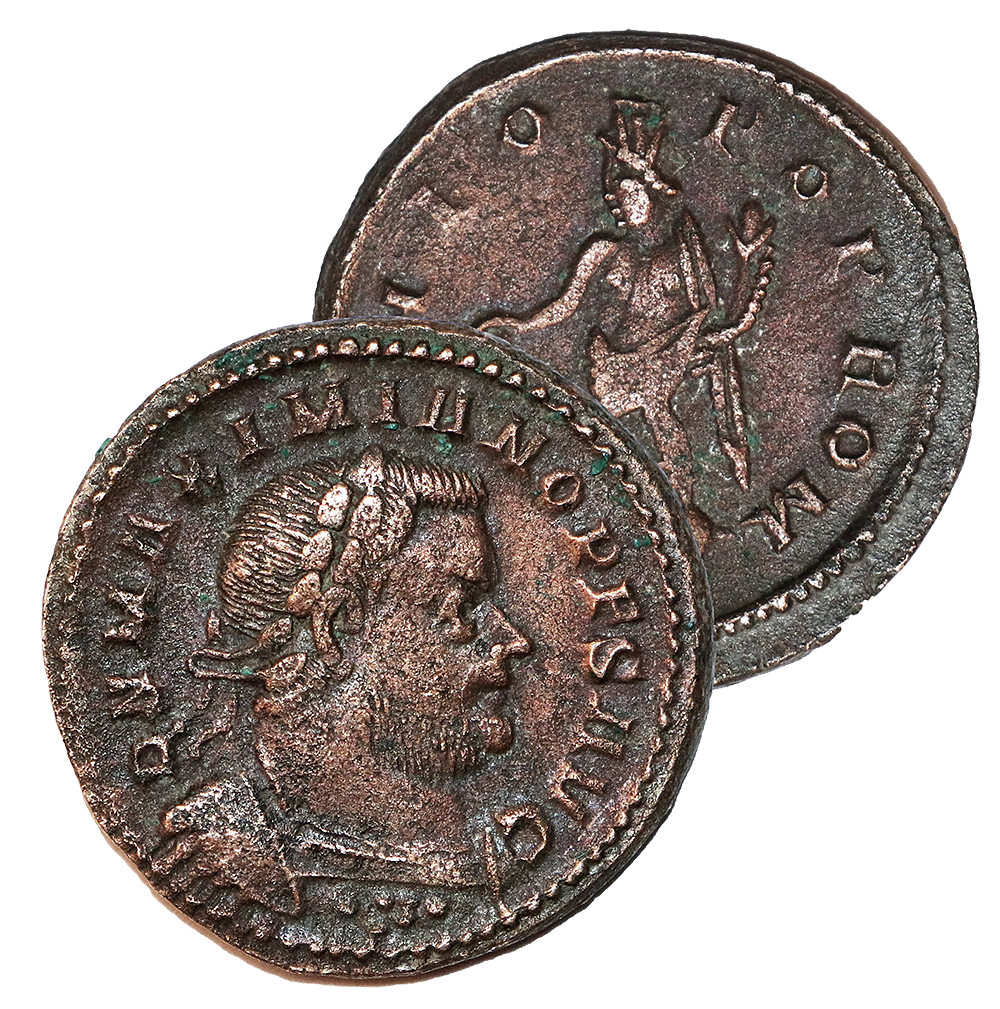
Bible, History, Archaeology
History,
Archaeology
Home > Historical figures > NT figures >
THE DIVINE AUGUSTUS (DIVINUS AGUSTUS)
and the imperial cult
How did we get here in the 1st century B.C.?
to establish an imperial cult?
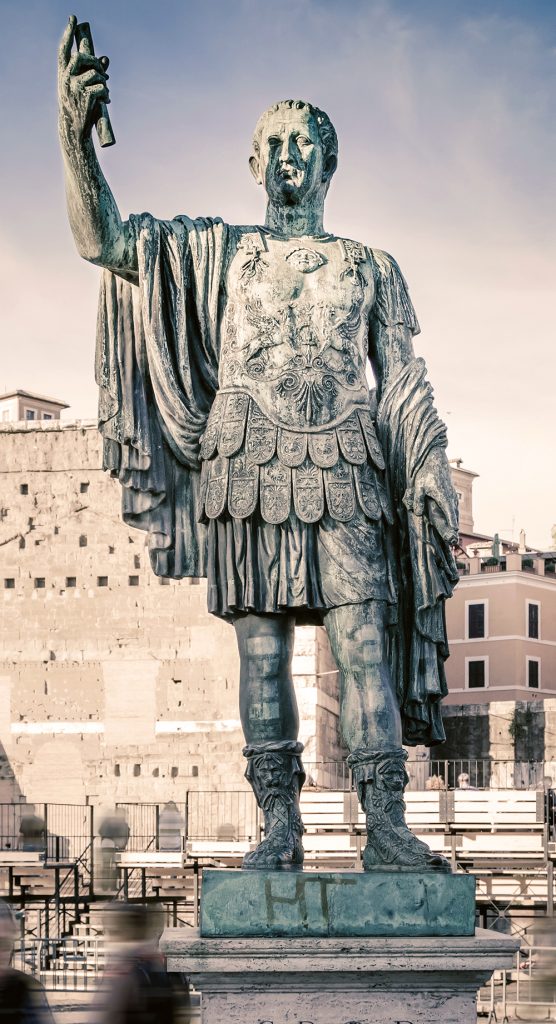
Image opposite: Statue of Gaius Julius Caesar in Rome © Lorenzooooo. 194174747.
The assassination of Caesar by supporters of the Republic did not meet with the approval of the people of Rome, nor did it prevent the senators from recognizing Octavian, his adopted son.
In 44 BC, during the celebration of games in memory of Caesar, a comet crossed the skies over Rome and many proclaimed that Caesar's soul had joined the gods. The Senate immediately decided to deify Caesar, and Octavian was able to claim that he was «a god".« the son of the deified » (divi filius). He had a statue of his father, surmounted by a star, erected in the temple of Venus Genitrix. Indeed, the iulius people, one of Rome's oldest families, boasted descent from Iule, the son of the Trojan Aeneas, himself the fruit of the union of a mortal and Venus (Aphrodite to the Greeks). (The People is made up of families who recognize the same Pater, wear the same nomen gentilicum and celebrate the same cult; thus Octavian took the name of Caesar, becoming Caius Iulius Caesar Octavianus.)
Roman Forum at sunrise, Rome © Nicolas Forenza. 1460317688.
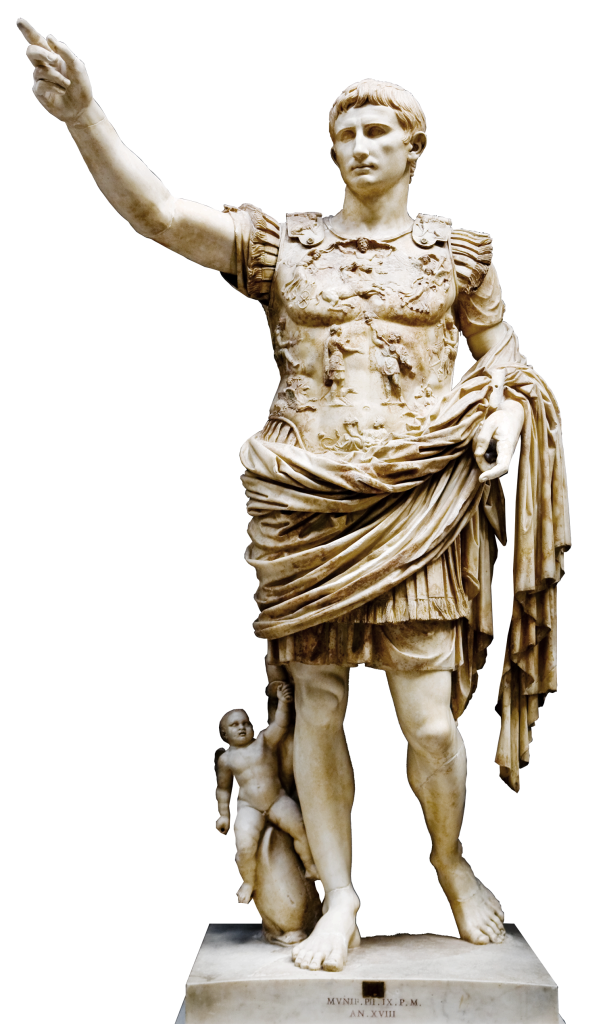
Little by little, too, the worship of the Engineering of Augustus multiplied, both in Rome and in the provinces of the empire. Every Roman is assisted by a Genius from birth to death, and is often depicted on domestic altars in the form of a snake. Sacrifice to Genius Augusti allowed the prince to be honored, and altars and temples to be erected, without recognizing him as a living god; Augustus always asked that this cult be associated with that of the goddess Rome. As a result, many cities built temples to Rome and Augustus.
Image opposite: statue of the emperor Caesar Augustus © Asier Villafranca. 24555340.
In 12 B.C., on the death of Lepidus, Augustus became Grand Pontiff in turn. The college of pontiffs supervised both public and private religious practices, and determined the duties of Romans towards their gods. This was an area to which Augustus was very attached, as he wanted to restore Roman religion according to the customs of the ancestors (mos majorum). The Grand Pontiff also drew up a list of good (working days) and bad (holidays) days, which was of obvious importance. As Grand Pontiff, Augustus encouraged the establishment of Lares augusti (lares of Augustus) among Lares compitales (= the lares of the crossroads) at Rome's crossroads. The lares are household gods, specific to each family, represented by small statues, and therefore only Augustus could install them, since they were his lares. The crossroads contained a multitude of small shrines and were the religious center of Rome's neighborhoods; Augustus directed some of these cults towards that of his lares. lares augusti especially among the lower classes and slaves.
A further step was taken with the recognition and celebration of the Numen Augusti. Only the gods possessed a numen that is, their power to act. Augustus was regarded by the Senate as a superman who could possess this divine power, and even before his death, Tiberius dedicated an altar to him in Rome (9 CE).
In 14 CE, a week after his funeral, the Senate voted the senatus-consulte that made Augustus a god. the apotheosis. An ancient magistrate claimed to have seen an eagle rise from the pyre and carry the prince to heaven.
A session of the Senate in Rome.
The Senate is one of the oldest and most enduring political institutions in ancient Rome. Composed of representatives of the great families of senatorial rank, it played an important religious, legislative, financial and foreign policy role. Its role and influence on Roman political life evolved throughout history, reaching its apogee during the Roman Republic, between the 3rd and 2nd centuries BC.
Session of October 21st, 63 BC. Cicero denounces his adversary Catilina. Scene reconstructed by a 1912 chromolithograph © BRIDGEMAIMAGES.COM
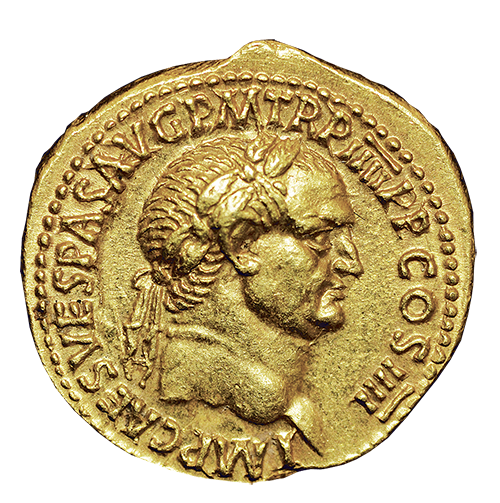
Image opposite: a gold coin (aureus) bearing the effigy of Emperor Vespasian. Public domain.
Apart from Caligula or Domitian, who liked to be called «dominus et deus (master and god) This is doubtful, given the anecdote about Vespasian who, at the moment of his death, humorously exclaimed: «I'm becoming a god! But while the divinization of their person was supposed to strengthen their authority, it didn't prevent plots and assassinations.
Imperial worship in the provinces
How was imperial worship received in the provinces of the Roman Empire?
All the provinces of the Empire were concerned, and everywhere except Judea, he was readily accepted, the emperor adding his name to the list of the many divinities honored by the various peoples. The Romans, in fact, left people free to choose their own worship, and did not demand exclusivity in their favor.
The procedure of divinization and adoration was already practised with regard to sovereigns by the Egyptians and Greeks, and therefore posed no problem. On the contrary, the cities were quick to show their loyalty and attachment to Rome by establishing statues in the prince's effigy, altars, temples, ceremonies in the emperor's honor; provincial assemblies and flames (= priests) were founded in each chief town, with sums of money earmarked for the upkeep of this cult. Archaeological evidence of this can be found in Narbonne, for example, where the assembly of the province's cities met once a year to celebrate the emperor's birthday, or in Galatia (Asia), where a marble inscription (a copy of the one in Rome, which was made of bronze) of the "Cistercians of Galatia" was erected. Res gestae divi Augusti, assessment of his actions made by Augustus shortly before the end of his reign. The provinces vied with each other to please the powers that be, and the imperial cult created a powerful bond with the emperor.
There is, however, one province where the imperial cult had difficulty establishing itself, and was even rejected: Judea, and especially the city of Jerusalem.
Image opposite: Judean currency (prutah). Kingdom of Herod: Agrippa I (41-42).
Obverse Canope-shaped parasol with bangs.
BASILEwS AGRIPPA (from King Agrippa)
Revers three ears of wheat
LS (Year 6). © cgb.fr
The special religious status of the Jews was recognized by the Romans when they conquered Egypt, Greece and Asia, where they found Jews freely practicing their religion. By virtue of the Romans« respect for ancestral laws and customs, they granted derogations to the Jews, which even became official protection under Julius Caesar and then Augustus: the most striking example is the worship performed in the Jerusalem Temple, which included prayers in favor of the emperor but not to his person. In fact, during his lifetime, Augustus never wanted to be called a god, and neither did any of the other emperors, with the exception of those considered »evil" (Nero, Caligula, Domitian). The imperial cult was celebrated in Judean cities where the population was not predominantly Jewish, such as Caesarea or Tiberias, but not in Jerusalem. The only emperor to attempt to impose it was Caligula, who demanded that his statue be placed in the Temple's Holy of Holies.
Image opposite: a proposed reconstruction of Herod's Temple in Jerusalem. © AdobeStock 48122482.
This claim clashed head-on with the commandments of Jewish law (Torah): «... You shall have no other gods before me. Thou shalt not make unto thee any graven image, ... thou shalt not bow down thyself to them...»(Exodus 20, 3-5). Petronius, the Syrian legate, aware of the stakes, used the statue's construction as a pretext to postpone the deadline, and in the end it was King Agrippa I who obtained the statue's removal as a gift from Caligula (with whom he had spent his youth).
The incompatibility of imperial worship with Judaism was so obvious that no further attempts to impose it were made after Caligula's. Moreover, Emperor Claudius explicitly rejected his predecessor's attempt, and the Roman shields placed by Pilate in the Temple were even removed because they offended the population. The Jews contented themselves with a few honors and a show of loyalty (wreath offerings, synagogue dedications, prayers in the Temple for the emperor).
From aurei (plural of aureus) representing the three Roman emperors considered «evil» by the Senate of Rome:
from left to right: Caligula (12-41), Nero (37-68), and Domitian (51-96) © All rights reserved.
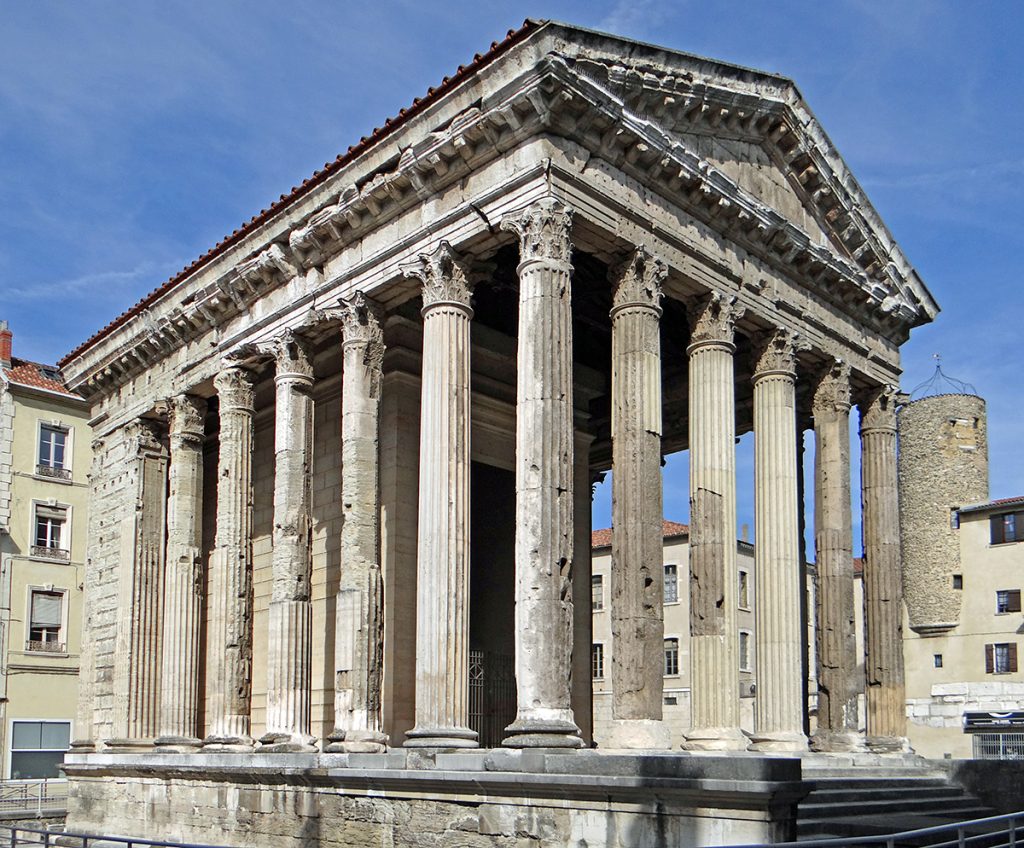
But there's another group with whom the imperial cult doesn't go down well, and that's the Christians.
The Romans believed themselves to be a particularly religious people, the religion par excellence being of course their own, the one that commanded respect for their gods. Cicero links the notion of religio to the verb religere collect. For him, «those who carefully take up and collect, as it were, everything connected with divine worship, are called «religious»". He contrasts this with superstitio, The word has taken on a broad meaning,« he adds; this broad meaning includes all the incomprehensible rites of other cults, which appear as superstitions. Cicero describes Judaism as barbara superstitio and other Latin authors think the same (Quintilian, Plutarch, Tacitus...). Tacitus uses the same term with regard to nascent Christianity, as does Suetonius in his The lives of the twelve Caesars : « The Christians, a kind of people devoted to a new and harmful superstition, were handed over to be tortured. ».
Image opposite: Roman temple in Vienna. At the time of its construction, the temple was dedicated to imperial worship in honor of Emperor Augustus and his wife Livia. The temple was considered a place of omens and signs of good fortune. Jacques Mosson.
Christianity is considered «new» and therefore suspicious, because it lacks the backing of antiquity, and «evil» because it leads its followers to disregard the "law of the land". mos majorum, On the one hand, they were not allowed to follow the «customs of their ancestors», nor to take part in the life and rituals of the city, including imperial worship. On the other hand, they were not an ethnic group entitled to their own religion, according to the rules applied by the Romans to subjugated peoples. Tacitus considers them «enemies of the human race». So it's hardly surprising that Nero chose them as scapegoats for the burning of Rome.
Image opposite: silver-plated bronze coin bearing the effigy of Constantine I (247-337). © John Conduit.
But what did Christians have to do to worship the emperor? They were asked to pour a little wine and incense on an altar in front of an image of the emperor; this was the minimum ritual gesture expected by those in power. Some Christians, denounced and asked to perform the ritual, considered that it did not engage their inner convictions and went ahead with it, but others preferred to die rather than renounce their faith.
Persecution of Christians therefore occurred under twelve of the fifty-four emperors who reigned from 30 to 331 AD, and in 202, Romans were forbidden to embrace Judaism or Christianity.
The imperial cult, recognized and practiced throughout the Empire as a symbol of the unity of the Roman world around the emperor, reached its limits until its disappearance when the Empire became Christian after Constantine I the Great (310 - 337 AD).
For those who want to know more:
ROME, CITÉ UNIVERSELLE, From Caesar to Caracalla. Mondes Anciens collection. Belin.
ROME, JERUSALEM AND JUDEA. Mireille Hadas-Lebel. A et J Picard.
GUIDE ROMAIN ANTIQUE G. Hocquart. Classique Hachette.


